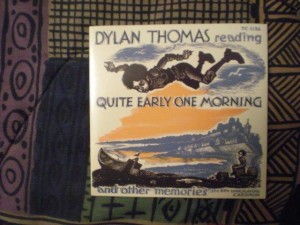(re. choosing one’s surrounding symbolic imagery–old Dylan Thomas LP cover now in wall frame in my bedroom)
I wake up where I want to be–in a room with plants and a bookcase of great English literature with a large bust of Shakespeare on top looking down at me. On one side of the bed, there is a CD-cassette player with headphones if I want to listen to an audiobook before I go to bed or in the night if I am awake enough. In one corner there are four large plants breathing happily away.
After waking and reading an actual newspaper, when I am in the semi-darkness of the family room, sipping coffee and eating three oatmeal cookies, the tv is usually turned on to the Frame channel. I never know what world in or prospect I will abruptly transported to: the barreness or majesty of some northern Canadian park, a rainy day in Paris (complete with young woman streetwalker) to a pan of some Mediterranean vista. Armchair travel at its best.
The mind, especially when waking up/coming to needs its visual imagery. We all live in contexts of our choice. the mind and imagination require stimulation, play, pleasure, and engagement. As said My Dinner with Andre, we do not need to travel to Athens or Egypt to mentally/emotionally/spiritually/innerly imagine, apprehend, and know these places. (The realities of such go without saying, though, of course–a separate topic–live in-person presence.)
We live in many contexts during our daze and lives. We experience them on many different levels, some of them imaginatively and intuitively. To some extent, we don’t need to leave home or city to experience these other realities and presences.There can be contentment and satisfaction in watching a really good documentary or thumbing through a visual presentation of a place or process. Like everything else, it depends on the individual and his or her capabilities and the realization of certain of skills and sensibilities.
One can experience an entire world or imaginatively live in another time and place while reading Pride and Prejudice or while viewing Lawrence of Arabia. These are many very real, fulfilling forms of experience with which we can contextualize our lives and draw fulfillment from. In a real sense, it is quite possible to not need anyone else, any society, or to have a bucket list of places to travel to.
Fully realizing one’s own powers and possibilities. Becoming conscious of how what’s ‘out there’ can be ‘swallowed’ and ‘satisfactorily digested’ by our own persons. “I am large, I contain multitudes.”–Walt Whitman
Indeed.
The apparently restrictive/restricting surrounding parameters, people, and contexts of our lives. How easily are they swept away by consciousness, autonomy, and acts of sheer will!
I’ve often talked of the importance of freedom to everyone and everything, but ultimately, freedom is very much an individual and perceptual matter. Freedom is ultimately what we choose for ourselves, to enhance our lives, and to make them more pleasurable and meaningful.
So context, though important and sometimes/often limiting as conventionally understood, is something we can redefine and recreate in our own basic daily lives. Personally, I have not viewed context as limiting for a long time–maybe back to teaching, which I left 14 years ago. Beyond that, the pleasure and satisfaction of making my own choices for my life, family, and a few close friends. Great freedom that.
Is process necessarily/automatically limiting? “Though I sang in my chains like the sea”–Dylan Thomas, “Fern Hill” conclusion. I think not. There are only trillions of possibilities and processes. And we can choose our own attitudes, involvements, and attitudes toward all that neverending change and process. Not simply be ‘swept along’ or ‘pig-pile’ (Frank Lloyd Wright term)/i.e., ‘follow the herd’ and do what they stereotypically do.
As I say above, we choose our processes and contexts. We have to be happy with ourselves, with who we are, with how we live. We make our own worlds and lives. No one else. A great responsibility, as the Existentialists underlined. We are responsible for our own integrity, meanings, and purpose. No one else. We have to live with ourselves and accept our selves–the last trick of maturation. When we can do that, we will be truly free inside and have an inner peace that belies every weekend rush to the mall or every “I don’t know what to do.”

